If you are planning on choosing a candidate to RUN FOR PRESIDENT in 2016 - check your state's laws on Primary election voting - you may be surprised. I had no idea until I happened to read someone's comment online urging people to check this out in their state.
I changed my long standing registered Democrat to Republican this year because I want to be able to choose who will run as the Republican candidate for President of the United States. In NJ it was really easy to access the NJ State Department Division of Elections website. I was able to download the proper form and filing information with no problem. There is often a time limit before primary date so if you want your vote to count, time to get working on it now.
Primary voting wasn't something most people get involved in. They often, like me, wait to see who's running on the big ticket and then go out and vote. I have almost always voted on Election Day but I have never voted in a Primary election before. With many different candidates running for nomination in both parties, this year I feel more involved than ever before. Our country is really needing some great leaders and while no one running can probably fix our whole world all at once, I really feel like it's up to Americans to get involved, get the facts and get our voices heard.
Did you know depending on the State you live in, you must be affiliated with the Party you want to choose the candidate from in the Primary Elections! I did not know this. New Jersey is a strictly closed Primary process in which the election of party candidates is limited to only party affiliated members as registered. Click on the map below for more information
Different states have different laws and the best way to figure out your status in your state for voting in the Primary elections is checking it out on sites like FairVote.org or the links below to learn more about it. Check out your own State Department's website and find out where you stand.
The information is from the National Conference of State Legislatures
Closed States
Closed Primaries
Eleven states operate closed primary elections or caucuses. In either case, only voters who are registered as members of a political party prior to the primary date may participate in the nomination process for its candidates.
Proponents say that closed systems contribute to a strong party organization. Opponents note that independent or unaffiliated voters are excluded from the process.
| States | ||
|---|---|---|
Delaware
|
Maine
|
New York
|
Florida
|
Nevada
|
Pennsylvania
|
Kansas
|
New Jersey
|
Wyoming
|
Kentucky
|
New Mexico
|
Open states
Open Primaries
Eleven states operate open primaries, which permit any registered voter to cast a vote in a primary, regardless of his or her political affiliation. This means that a Democrat could "cross over” and cast a vote in the Republican primary, or vice versa, and an unaffiliated voter can choose either major party's primary.
Proponents say that this system gives voters maximum flexibility because they can cross party lines. Opponents counter that this system dilutes a political party’s ability to nominate its own candidate without interference from non-members.
Alabama
|
Michigan
|
North Dakota
|
|---|---|---|
Arkansas
|
Minnesota
|
Vermont
|
Georgia
|
Missouri
|
Wisconsin
|
Hawaii
|
Montana
|


No comments:
Post a Comment